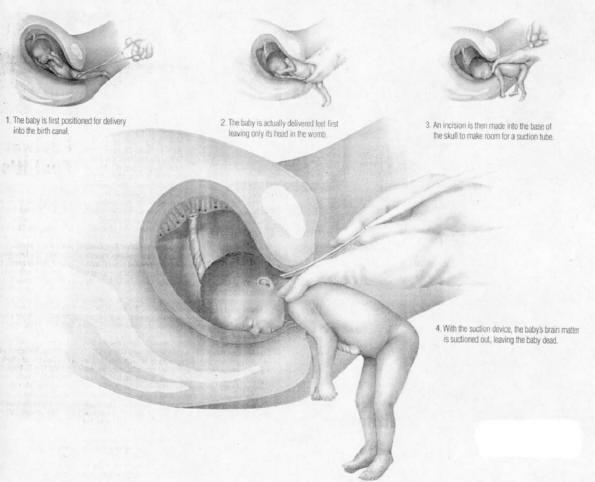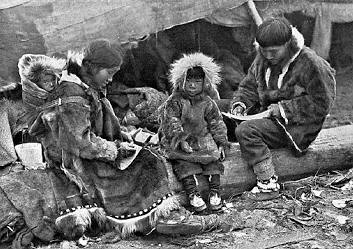3.
How does the fact that our own society's stand on both the legality and
morality of abortion has changed radically in the past 30 years affect our
certainty regarding the immorality of infanticide? Isn't it quite possible
that future generations may come to accept infanticide as a reasonable method
of family planning, just as we now accept abortion and increasingly accept
euthanasia and doctor-assisted suicide --practices which would have resulted
in a doctor's losing his or her license to practice medicine a mere 10 years
ago?
4.
Steven Pinker, in his article,
"Why They Kill Their
Newborns",
distinguishes between
neonaticide
and the killing of older children (filicide).
He shows that, while our own society condemns infanticide, we are, in fact,
quite tolerant of those who kill newly born children. He reports that of
nearly 300 women charged with neonaticide in the U.S., not one spent more than
a night in jail. The general population was much more willing to deal
leniently, for example, with the Grossberg-Peterson case involving the killing
of a newborn than they were with the case of Susan Smith, who killed her two
sons: one 14 months old, and the other 3 year old.
5.
Our notion that infanticide is committed by disturbed individuals is also
not supported by research. First of all, women who practice neonaticide
generally go on to become loving supportive mothers when they do have and
raise children (as do mothers who have had abortions), in contrast to those
women who kill older children. Secondly, as Pinker states, "it's hard to
maintain that neonaticide is an illness when we learn that it has been
practiced and accepted in most cultures throughout history."
6. The
acceptance of abortion but not infanticide in the U.S. has been justified on
the grounds that a baby is alive while a fetus is not. When does a human
life begin? How do we define life?
In
the article referred to above, Steven Pinker discusses
how difficult it is to determine when a human
organism becomes a person
with a right to life. Conception, birth, the end of the second trimester
are all rather arbitrary
definition points for when a human organism becomes a person.
Viability
is also problematic, given that the human infant cannot survive on its own for
several years after its birth and that many infants cannot survive at all
without medical intervention, to say nothing of large numbers of the elderly. Furthermore, infant viability is a matter of
degree and is clearly much less developed in humans than in most other
mammals. Given the difficulty of establishing clear objective criteria for
when
personhood
is achieved --in some societies "personhood" is not conferred until well
after birth-- on what grounds do we claim that one point in the human
organism's development is more valid and objective (i.e., less arbitrary) for
establishing "personhood" and, thus, a right to life than any other point? If
the definition of "personhood" is largely socially determined, to
what extent is the criteria used for defining "personhood" in our own society
any more objective and valid than that used in other societies? How does the
controversy over when an abortion is acceptably performed in the U.S. affect
our understanding of the social basis of our society's definition of when life
begins? What factors determine who is likely to accept Pinker's
definition and who is likely to reject it? How does their
stand on the issue reflect their personal interests rather than an objective
scientific look at
the issue? Furthermore, when we set arbitrary boundaries as our defining points
for the beginning of life, to what extent do we inadvertently kill human
organisms that develop more quickly than the established norm? Finally, why
is "personhood" used to determine when a human organism is alive
rather than some less subjective critria? If we don't
use "doghood" or "cathood" to determine when dogs and cats are alive, are we
being logically
inconsistent
to use "personhood" to determine when humans are alive? Is there a
uniform, objective biological definition for the beginning of life that can be
applied systematically to all living organisms, including dogs, cats and humans?
Most biology textbooks define life as possessing the following
characteristics: Cells, energy,
heredity, reproduction and responsiveness to the
environment.
All living things are composed of cells. Even such microscopic unicellular organisms
as bacteria are considered alive. All living things also acquire and use
energy to maintain metabolism.
All living organisms also possess DNA organized into genes and chromosomes
which form the blueprint for how that organism will develop and grow.
Similarly, all living organisms are potentially capable of reproduction.
Being able to reproduce offspring which share their genetic material, living
organisms (unlike non-living matter) are
able to cause the transfer of genetic information from one generation to the
next. Finally, living organisms are responsive to their environments.
That is, they are affected by their environments and attempt to adapt to those
environments. Are these characteristics, which are presented as
distinguishing living organisms in nearly every biology textbook written, less
applicable to a fetus than to a baby or a young child, to an invalid or an
octogenarian, or for that matter to any human being? (Would they also
apply to both the sperm and the unfertilized egg? The Roman Catholic Church
maintains that they do, which is why it opposed artificial birth control.) If so,
then on what logical or scientific grounds is it determined that a baby or a
child is alive but not a fetus? What does this say about our society's
support of abortion but not infanticide? Is it
logically consistent? And if it is not, then why is it so widely
accepted?
The definition of when life begins has
changed radically in the U.S. during the past 40 years.
To what extent has the definition of when life begins changed because newer
definitions serve the changing interests of the individuals or political groups
doing the defining?
To what extent is the changing definition of life and the recourse to
such concepts as "personhood" a function of
the pivotal role that the abortion issue plays in American politics?
Proponents of abortion in the U.S. refer to abortion as a "right" and
challenge any qualification on a woman's "right to choose". Any factor
that threatens that "right" is vigorously opposed, including mandatory waiting
periods and parental notification laws. To what extent might the
application of an objective interspecies definition of life to humans in
general and to fetuses in particular, also be perceived as a threat by those
who want to promote abortion as their "right"? A recent article in
The Economist
titled "The War That Never Ends" (June 13, 2003) examined the abortion issue in
the U.S. at the 25th anniversary of Roe vs. Wade. The article
distinguished between the continuing controversy over abortion in the U.S. and
its general acceptance in Europe, including in such predominantly Roman
Catholic countries as France, Spain and Italy. The article viewed the
problem this way.
Why does abortion remain so much more
controversial in America than in the other countries that have legalised it?
The fundamental reason is the way the Americans went about legalisation.
European countries did so through legislation and, occasionally, referenda.
This allowed abortion opponents to vent their objections and legislators to
adjust the rules to local tastes. Above all, it gave legalisation the
legitimacy of majority support.
Most European countries provide abortion
free. But they have also hedged the practice with all sorts of qualifications.
They justify abortion on the basis of health rather than rights. Many European
countries impose a 12-week limit (America, by contrast, allows abortion up to
about 24 weeks and beyond, and many abortion-rights advocates seem to oppose
any restrictions.) Frances Kissling, head of Catholics for a Free Choice, also
points out that the Europeans have been careful to preserve a patina of
disapproval. Even in England, the country with the most liberal abortion laws
in Europe, women have to get permission from two doctors.
America went down the alternative route of
declaring abortion a constitutional right. (The only other country that has
done anything comparable is South Africa.) A seven-to-two majority of justices
struck down state abortion laws on the grounds that reproductive rights are
included in a fundamental right to privacy which—rather like freedom of speech
and freedom of religion—is guaranteed by the constitution.
Finally, to what extent does the legalization (and social acceptance of late
term abortions (a.k.a. partial-birth abortions) confuse the distinction
between abortions and infanticide (see question 17 below)?
The following letters to the editor in the Philadelphia
Inquirer
(November 21, 1996), written in response to the Grossberg-Peterson infanticide
killings, illustrate the ambiguous line separating abortion from infanticide.

7. If
a scientific model of population/resource relations developed from careful
research predicts that under certain conditions populations will likely adopt
behaviors that reduce the number of offspring produced (either through
abortion or infanticide), how can we judge people as morally wrong whose
behavior fits the predictions of the model? Doesn't this amount to rejecting
science when it disagrees with our beliefs?
8.
Pinker and numerous others have demonstrated that infanticide is widely practiced
throughout the animal kingdom: not just among human populations, but among a
diverse variety of animal species. If infanticidal behavior is practiced by
such diverse species as rodents, birds and primates, why should we not expect
it to be practiced by humans as well? Wouldn't it be tantamount to accepting the
Human Exemptionist Paradigm
(HEP)
and to rejecting both the
Uniformitarian Principle
and the application of Darwinian evolutionary principles to human populations
to expect otherwise? On what scientific basis do we claim that human behavior
in this case should be seen as distinct from that of other species? Shouldn't
our evaluation be decided on the basis of empirical research rather than on
the
a priori
application of culturally-based moral and political philosophies?
9.
If we state that human infanticide is morally wrong while chimpanzee
infanticide is okay, are we simply being
anthropocentric? Where do we draw the
line? Many claim that the human ability to make such a moral choice
makes us different from chimps. To what extent are the moral
philosophies that emphasize our differences from (as opposed to our
similarities with) the rest of the animal kingdom simply examples of our
species-centric
world view?
10.
If we take the position that infanticide is acceptable for non-human primates
but not for humans, at what point in our evolution do we apply a
universalistic condemnation of infanticide? Was it immoral for Neanderthals
to practice infanticide? What about Homo erectus? These are both classified
as
humans.
What about the Australopithecines? They are considered intermediate between
apes and humans. Does the problem of defining humanness and moral
responsibility become somewhat like that of the Roman Catholic Church trying
to determine which fossil species had a soul?
11.
To what extent is it naïve
anthropocentrism
to assume, despite extensive evidence to the contrary, that humans are
sufficiently different from all other species so as not to be subject to
evolutionary principles (biological or social), including those associated
with such birth spacing mechanisms as abortion and infanticide? Does E. O.
Wilson's quote that "the behavior of animals is determined mostly by
evolution, while humans have options for self-improvement in line with
civilized ideals" amount to a rejection of Uniformitarianism and a scientific
understanding of human behavior? Does his comment represent good science, or
does it represent the rejection of a materialist scientific approach to the
study and evaluation of human behavior in favor of discredited mentalistic
explanations for the evolution of human societies? To what extent do such
mentalistic explanations of human behavior function as part of the
HEP?
Does Wilson's comment represent any less a rejection of a systematic
understanding of the causes of human social behavior than John Swanton's
statement that "all that is needed to end warfare is the will to do so." Does
Wilson provide any more sophisticated an assessment of human behavior in
relation to infanticide than Swanton provided on warfare?
12.
Many people, especially feminists, object to the disproportionate female
infanticide that is practiced in many societies. Would it be more morally
acceptable, or even "better," if disproportionately more males were killed, or
if the infanticide sex ratios were more equal? Similarly, should we be
morally concerned about the use of amniocentesis and ultrasound in countries
such as India and China to determine the sex of a fetus in order to abort
female fetuses? If the
cost/benefit
considerations of males vs. females in a particular society leads to the
differential killing of one sex over another, is that morally wrong, or is it
simply a matter of prospective parents making choices which best fit their
circumstances? Is this any different from prospective parents in the U.S.
choosing to use contraceptives or to have an abortion based on their
circumstances? How many prospective parents in the U.S. have an ultrasound
performed in order to determine if the fetus has serious medical problems,
such as spinal meningitis, that might
warrant having an abortion? Do pro-choice principles apply here, or is there
a right vs. wrong behavior? And who determines which behavior is right or
wrong? Might not Western opposition to female infanticide in China, India and
elsewhere represent an example of Frank Ferudi's (North
Waging Cultural War against South)
claim that the West routinely asserts its moral superiority over the rest of
the world and systematically attempts to impose Western views of acceptable
social behavior on other peoples and societies for whom those views are not
necessarily appropriate. Finally, how do feminists explain those societies
which practice disproportionately male infanticide, and do they criticize this
inequity as well?
13.
Most people who see infanticide as
violence against an innocent
child don't view abortion in the
same way. Many other people, however, do view abortion as violence
against an innocent child --an
"unborn child". This is
precisely why they oppose abortion so passionately. Why would we be
surprised that they respond the way they do? Is it any different from
how Americans in general would respond to the practice of infanticide?
Why do some people see infanticide as violence, but not abortion? How do
we define violence scientifically? Do people apply their definition consistently?
Does the definition apply to abortion and infanticide equally, or does it not?
While liberals frequently accuse conservatives of being inconsistent in
their definition of "pro-life" because they oppose abortion but not the death
penalty, conservatives accuse liberals of being inconsistent by
opposing the death penalty on the grounds that it is violent and cruel but not
opposing abortion on the same grounds? Also, if either infanticide
and/or abortion were defined as "violence", what implications would this have
for our understanding of the relationship between gender and violence, given
that women are the primary individuals who practice both
abortion and infanticide?
14.
To what extent is the attitude in our society towards abortion vs. infanticide
a function of material
conditions which
prevail here but which don't apply elsewhere? To what extent would the
application of family planning programs based on Western notions of what is
appropriate succeed or fail when introduced into social situations based on
very different
infrastructural
conditions? If female infanticide and abortion have a greater regulatory
effect on population growth, due to the role of women in reproduction, might
not disproportional female infanticide and abortion be considered more
adaptive in those societies with high birth rates and, thus, be preferred?
Wouldn't this result in a more rational family planning strategy than one
opposing preferential female infanticide and abortion?
15.
There is frequently a difference between what a society defines as morally
right and wrong and what is in a specific individual's best interest. Is it
reasonable and consistent with social science research to expect an individual to sacrifice his or her own self-interest
simply because the group defines a specific behavior as wrong? To what extent
is the larger society's definition of morality, even as it regards human life
(viz. abortion, infanticide, warfare, capital punishment, etc.), a function of
existing power relations in that society? Since the poor and the powerless
are rarely in a position to influence, let alone determine, laws and social
policy, to what extent do laws and social norms regarding abortion or
infanticide reflect class interests? If in a state-level society, some
individuals have greater access to power and authority in defining what is
both legally and morally right and wrong, are those individuals who reject the
rules and laws established by those in power wrong for doing so? Were, for
example, those women who had abortions in the 1960's morally wrong because the
society at large viewed abortions as murder at that time? Similarly, if an
urban-based elite in China decrees that everyone must have only one child
while outlawing the use of ultrasound and amniocentesis to determine the sex
of a child for purposes of deciding on an abortion, is it wrong for rural
Chinese peasants to practice female infanticide in order to assure that they
have a male heir who will provide a future for their family?
16.
According to Margaret Talbot, the RU-486 (the abortion pill) is likely
to have a major impact on the abortion controversy in the U.S. Abortion
is a highly charged issue in the U.S., with widely distributed opposition.
Talbot argues that by making abortion more anonymous and more common at an
earlier time in a woman's pregnancy, RU-486 will likely make abortion more
common and more socially acceptable. Talbot is, in essence, discussing
the evolution of the social acceptability of a highly controversial behavior.
How might our understanding of the increasing social acceptability of abortion
in the U.S. help us to understand how infanticide became acceptable in other
societies?

17. Late
Term Abortion
(a.k.a.
Partial Birth Abortion)
[technically referred to as
"intact dilation and extraction"] is a highly controversial procedure. It also raises provocative
questions regarding the distinction between abortion and infanticide.
If, as the above illustration indicates, the fetus/baby is killed after the
majority of its body is removed from the womb, would this procedure be more
accurately defined as abortion or infanticide? Is the
fetus/baby alive or not at the time the procedure is performed? Is it human?
Is its "personhood" (to use Steven Pinker's term) less than that of the baby
killed by Grossberg and Peterson? How would one make such a determination?
What criteria would be used? What anthropological explanation might
account for why some Americans define this procedure as infanticide, while others would
define it as abortion, and why many Americans believed that Grossberg and
Peterson should have been be tried for murder while many others did not?
* *
* * *
Of Related
Interest:
* *
* * *

Home








